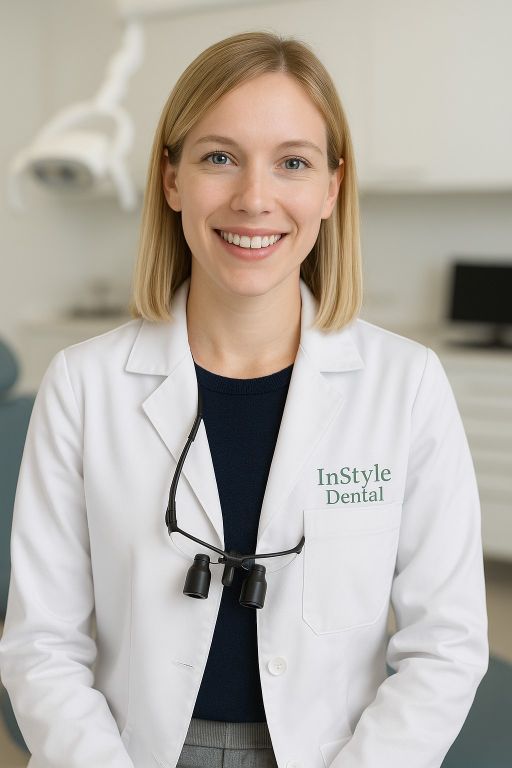TREATMENT FOR TOOTH SENSITIVITY
Tooth Sensitivity Treatment in New York
Feeling a sharp pain when you sip a hot coffee or bite into ice cream can make even simple pleasures stressful. At InStyle Dental, we offer gentle, effective tooth sensitivity treatment in New York to help you get back to enjoying your favorite foods and drinks without discomfort.
What is Tooth Sensitivity?
Tooth sensitivity occurs when the protective layer of your teeth, the enamel, is worn down or when your gums pull away from your teeth, exposing the more delicate root surfaces. This exposure allows the pain signals to reach the nerve inside your tooth. The discomfort can be a quick twinge or a sharp, lingering pain. Sometimes called dental sensitivity, this condition can affect one tooth or multiple teeth. It can cause increased sensitivity when eating acidic foods, drinking hot or cold beverages, or even breathing in cold air. Tooth sensitivity can be temporary or long-term depending on the cause. If gum recession occurs or the enamel is damaged, the sensitive part of the tooth, the dentin, is exposed. This allows the triggers to reach the nerve and cause discomfort. If left untreated, tooth sensitivity can lead to more serious dental problems like tooth decay, deep decay, or advanced gum recession. Addressing the issue early with tooth sensitivity treatment will protect your oral health and make daily life more comfortable.

What Causes Tooth Sensitivity?
There are many possible causes for sensitive teeth, and in some cases, multiple factors may contribute. Understanding the cause is essential for finding the right sensitivity treatment. The most common causes include:
- Gum recession – Often from excessive brushing pressure on teeth or gum disease.
- Tooth enamel wear from acidic foods or enamel erosion.
- Cracked teeth that expose the nerve.
- Tooth decay or deep decay reaching the dentin.
- Dental cleaning or whitening treatments (temporary sensitivity).
- Past dental restorations that may need repair.
- Exposure of root surfaces due to receding gums.
Habits like teeth grinding, chewing on hard objects, and consuming acidic foods can increase the risk. Over time, untreated tooth sensitivity can lead to persistent pain and the need for more complex dental procedures
Common Signs and Symptoms
Tooth sensitivity can range from mild irritation to severe discomfort. The symptoms may appear suddenly or gradually worsen over time. Some patients experience sharp pain only occasionally, while others feel discomfort daily. Identifying these symptoms early helps in starting tooth sensitivity treatment before the problem worsens. Common signs include:
Sharp pain when eating hot, cold, sweet, or sour foods
Tingling or discomfort when brushing or flossing
Pain that comes and goes
Discomfort in one specific tooth or several teeth
When to See a Dentist?
You should visit a dentist for comfortable tooth sensitivity treatment if:
- Your sensitivity lasts more than a week
- You notice visible gum recession or gum tissue loss
- You have a chipped or cracked tooth
- There’s sharp pain that doesn’t go away
- You see signs of tooth decay or dark spots on your teeth
Delaying treatment can lead to more severe dental issues, including the need for a root canal or surgical gum graft. Seeking care early ensures we can reduce painful sensations and protect your teeth.
How We Diagnose and Assess Tooth Sensitivity
At InStyle Dental, diagnosing tooth sensitivity starts with a conversation about your symptoms, habits, and medical history. We also look for signs of enamel erosion and evaluate your brushing technique to ensure it does not involve excessive brushing pressure teeth. This process usually takes less than an hour, and you will leave with a clear understanding of what is causing your sensitivity and the best way to address it. We then perform a thorough examination, which may include:
Treatment Options for Tooth Sensitivity
At InStyle Dental, we offer both in-office and at-home care to treat sensitive teeth. Every sensitivity treatment plan is personalized to your needs. Our goal is to not only treat your current discomfort but also prevent sensitivity from returning.
In-office treatments may include:
- Dental cleaning to remove plaque and tartar buildup.
- Fluoride treatment or in-office fluoride gel to strengthen tooth enamel and reduce painful sensations.
- Fillings or dental restorations for cavities or deep decay.
- Surgical gum graft to cover exposed root surfaces.
- Root canal therapy for severe nerve damage.
At-home recommendations may include:
- Using desensitizing toothpaste to block pain signals from reaching the nerve.
- Avoiding acidic foods and drinks that contribute to enamel erosion.
- Brushing gently to avoid gum recession from excessive pressure.
- Following a
good oral hygiene routine with daily brushing and flossing.
Lifestyle changes may include:
- Wearing a mouthguard if you grind your teeth.
- Avoiding habits that cause receding gums.
- Choosing water and low-acid beverages instead of sodas and juices.

How to Prevent Tooth Sensitivity
Preventing sensitive teeth requires daily care and smart habits. Some steps you can take include:
- Brushing twice daily with desensitizing toothpaste.
- Avoiding acidic foods and drinks.
- Using a soft-bristled toothbrush to protect gum tissue.
- Scheduling regular dental cleaning appointments.
- Treating tooth decay early to prevent deep decay.
- Protecting your teeth from grinding damage.
Maintaining good oral hygiene and visiting your dentist regularly is the best way to stop increased sensitivity from returning.
Why Choose InStyle Dental for Tooth Sensitivity Treatment in New York?
Choosing InStyle Dental for your tooth sensitivity treatment in New York means choosing care that is gentle, effective, and backed by recommendations from the American Dental Association. We focus on your comfort and create a treatment plan designed for your unique needs. Our patients appreciate:
- Same-day appointments for urgent sensitivity cases.
- A welcoming, stress-free environment.
- Clear explanations of all liquid treatment options and procedures.
- Flexible payment and insurance assistance.
We believe in providing comfortable tooth sensitivity treatment so that you can return to enjoying your favorite meals without discomfort.
Frequently Asked Questions
Is sensitivity permanent?
No. With the right treatment, many people find their sensitivity improves or goes away completely. Following your dentist’s home care and regular check-ups will help prevent it from coming back.
Can whitening cause sensitivity?
Yes, whitening can cause temporary sensitivity in some patients. This is because whitening agents can weaken the tooth enamel for a short time. But the sensitivity usually goes away within a few days once the enamel rehydrates and recovers.
Will I need a root canal for sensitivity?
You will only need a root canal if the nerve inside your tooth is damaged. This can happen when deep decay or an injury reaches the pulp of the tooth. Your dentist will determine if this level of treatment is needed after an examination.
Can gum grafts help with sensitivity?
Yes, a gum graft can cover exposed root surfaces and reduce discomfort. This procedure involves covering the exposed area with healthy gum tissue to protect it from temperature changes and irritation. It’s especially helpful for patients with gum recession that’s causing persistent sensitivity.
Does fluoride really help?
Yes, fluoride treatment strengthens tooth enamel, making it more resistant to heat, cold, and acidic foods. It works by rebuilding weakened enamel and sealing off tiny channels that send pain signals to the nerve. This can reduce painful sensations and prevent future sensitivity.
Book Your Appointment Today!
If you are ready to stop avoiding the foods and drinks you love, we can help with tooth sensitivity treatment in New York. Our team will identify the cause of your discomfort and create a treatment plan tailored to your needs. With the right care, you can enjoy hot, cold, and sweet foods without worry. Relief from tooth sensitivity is closer than you think. Call
212-695-2173 or click the button below to schedule your appointment with InStyle Dental.

